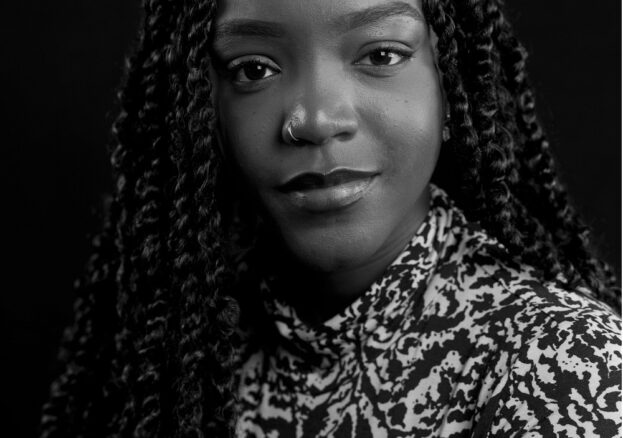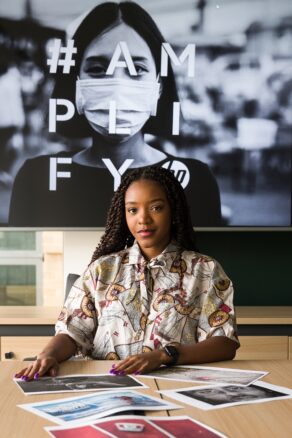
HP Inc. is an American multinational information technology company, that develops personal computers, printers and related supplies. But with 46% of their Board of Directors being women, and 54% being of a minority ethnic group, they’re paving the way in imbedding equality and diversity into culture. We met up with Elizabeth Adely, a Trade Marketing account manager at HP, to talk about DEI at HP.
HP believes that companies should do more than just make a profit, they should make the world a better place. In terms of DEI, how has HP been doing that?
As a multinational company, HP’s efforts have involved a commitment to elevate the count of Black and African American executives by 2025. Showcasing a remarkable increase of +33% since 2020 so far. Additionally, a global impact network has been established, accompanied by investments to bolster the advancement of inclusion and DEI undertakings. Furthermore, our collaboration with the Black History Month UK organisation and our active pursuit of job visibility on the Diversity Dashboard have contributed significantly to our endeavours. We believe a diverse workforce brings a range of perspectives and experiences, fostering innovation, improved decision-making, and better adaptability to a global market.

For those who don’t know, what does a Trade Marketing Manager do? And how does DEI influence what you do?
Trade Marketing Manager oversees local brand development and marketing execution, collaborating closely with retailers who subsequently deliver products to consumers. The influence of DEI in my role is manifested through its impact on marketing messaging and imagery, ensuring a diverse and inclusive representation that resonates with a broader audience.
As an intern, you were the co-creator of the UK Diversity, Equality & Inclusion Multicultural Business Impact Network. What does it do, and why did you create this project?
Business Impact Networks serve as a platform for those interested in taking an active role and transforming HP into a place where everyone can belong, innovate, and grow. In my case, this project was sparked by the events surrounding the George Floyd racial equality protests in 2020. My fellow intern and I recognised that HP UK & Ireland’s initial response could be more comprehensive, prompting us to take action. We believed that there was a need for enhanced education and awareness regarding racial inequality within the UK context. Commencing as Diversity and Inclusion workshops, these sessions delved into discussions about racism in the UK and how to effectively navigate challenging conversations surrounding it. As a result, this initiative evolved into a network that actively promotes inclusion and celebrates the richness of diversity in our community.
From sales advisor to digital marketing, to trade marketing account manager, how has your journey led you to being an advocate of EDI?
From a young age, I was instilled with a sense of pride in my heritage, guided by my family’s emphasis on recognising differences as a driving force to strive for greater accomplishments. This upbringing nurtured a determination to channel my efforts passionately into whatever I pursued, motivating me to work tirelessly to attain greater heights.
My innate passion and drive have consistently guided my pursuits, propelling me to invest myself fully in whatever endeavour I undertake—marketing being a significant focus. As my career evolved, I realised just how much the industry lacked the diversity it needed to truly reflect the world around us. This aspiration to foster a more inclusive environment was deeply rooted in my personal experiences and observations in the workforce. I longed to witness more inclusivity, where every individual’s unique background was celebrated and respected. Thus, when the chance to champion equity and diversity arose, I eagerly seized it. This opportunity was not just about personal growth but about opening doors for others and cultivating an environment where cultural inclusion was paramount. As I reflect on my journey, it’s clear that my experiences, passion, and commitment to advocating DEI have guided me towards fostering a workplace where everyone feels embraced and valued.
Why do you think it is important to have a diverse workforce?
Human Rights Even as we work to deepen our impact, we are focused on expanding the diversity of our workforce. Building a diverse and inclusive workforce is not only the right thing to do—it also makes good business sense. Diverse teams will always out-innovate and out-perform the market. HP aims to double the number of Black and African American HP executives by 2025 and reach 50/50 gender equality in leadership by 2030. And while HP is among the top technology companies for women in leadership positions—and nearly 45% of our U.S. hires in 2021 were racial/ethnic minorities—we are exploring ways to improve inclusive representation at all levels across all operating regions.
What programs or initiatives have you come across/ worked with that include historically underrepresented groups?
I have encountered and actively engaged with a spectrum of programs and initiatives dedicated to the inclusion of historically underrepresented groups. Within the context of Multicultural Impact Networks, a rich array of activities spanning thought-provoking discussions on Diversity, Equity, and Inclusion (DEI), immersive experiences through film and book clubs, enlightening workshops, vibrant cultural days, and even celebrations of diverse cuisines. The observance of LGBTQ Pride month stood out as a remarkable commitment, underlining our collective allyship and unwavering support for the LGBTQ+ community. In addition, the Women Impact Network’s impactful workshops and robust support mechanisms have left an indelible mark, fostering an environment where women can thrive and advance in their careers. The concept of mentorships has been pivotal, affording the chance for underrepresented individuals to receive guidance and encouragement from experienced professionals. Furthermore, our commitment to inclusivity has extended to our online presence, where our allyship has been showcased through retail activations that prominently feature our products on retailers’ websites.
What do you think should be done to challenge organisations who deny the need for equal representation of diverse groups?
To address organisations that dismiss the necessity of equal representation among diverse groups, a proactive approach involves advocating for education and awareness. Establishing Impact networks, like ours, can serve as a powerful tool to showcase the significant contributions made by minority groups within the company. Supported by concrete studies that demonstrate the positive correlation between a diverse workforce and enhanced company performance, these networks can effectively challenge the misconception and underscore the invaluable benefits of fostering inclusivity.
How can a workforce create a culture that allows its employees to belong, innovate and grow?
A workforce can cultivate a culture that facilitates employees’ sense of belonging, innovation, and growth by implementing several key strategies. First and foremost, organisations should endeavour to establish an environment where every individual feels valued and connected, ensuring that employees have a platform to voice their opinions and ideas. Diverse recruitment practices can play a pivotal role in fostering a culture of inclusion, as it brings in varied perspectives and experiences.
To further support employees’ growth, the company should provide ample opportunities for learning and development, enabling individuals to enhance their skills and broaden their horizons. Encouraging collaboration across different teams and departments can stimulate innovation by fostering the exchange of diverse ideas. Safe spaces should be created where employees can express themselves freely without fear of judgment or reprisal, thereby fostering a more open and inclusive atmosphere.
Listening to employees’ concerns, feedback, and suggestions is crucial, as it demonstrates a genuine commitment to their well-being and aspirations. The use of inclusive language throughout all communications is vital, reflecting an organisation’s dedication to respecting all individuals and their identities. Through the combination of these approaches, a workforce can effectively nurture a culture where employees not only feel they belong but also have the opportunity to innovate and grow to their fullest potential.
